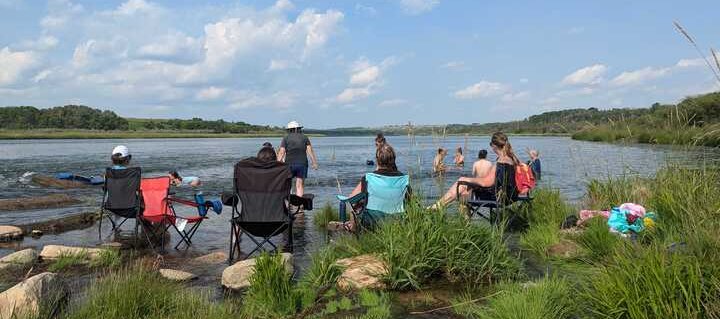
Land-based canoe trip fosters intergenerational learnings
In this issue
 Engage - Volume 15, Issue 2, Spring 2025
Engage - Volume 15, Issue 2, Spring 2025
Related Programs
A four-day canoe trip showed that land-based learning is a way to share Métis traditional teachings, as well as a space for kinship-building.
In the summer of 2024, the Gabriel Dumont Local 11 organized a canoe trip along the South Saskatchewan River — an event they called “Nandow aen Pambayihk aen Kanoo.” The journey hosted 18 community members, ranging from nine to 70 years old, for traditional skill-sharing. During the journey, Knowledge Keepers, language teachers, Elders, Aunties (or taants), and other community members were invited to engage with participants and foster a deeper understanding of Métis history and tradition.
Kendall Hanikenne, program lead and Michif language speaker, says that bringing a wide range of people together to learn encouraged meaningful relationship-building during the trip.
“People who were once strangers or acquaintances quickly became ‘auntie/ taant,’ ‘uncle/nook,’ ‘koohkooms,’ and ‘mooshooms,’” Hanikenne says. “The interactions and inclusivity of having adults, teenagers and children on the trip forged lifelong bonds, while bringing people together and connecting them to the land and Métis history.”
The evenings turned into teaching opportunities for plant and food identification, as well as for preparing traditional foods such as bison stew, bannock, and beans, followed by storytelling around a campfire. For Hanikenne, this range of activities showed the “rich and distinct heritage of the Métis and Michif communities.”
Faye Maurice, an Auntie/taant, helper, and plant teacher involved with the event, says that land-based activities such as this canoe trip are a good space for people to reflect on their cultural identity. “We need to reclaim, celebrate and preserve, as a community,” she says.
For Maurice, having the activity include a diverse group of varied ages and knowledge levels was essential for the learnings that took place.
“Youth were able to discover new skills and strengths, build confidence and gain a sense of belonging,” she says. “As older people, we have a responsibility to pass this knowledge down.”
Supported by the adults in the group and the land around them, the youth took part in traditional activities such as language learning, storytelling, crafting, and cooking during the journey.
The learnings started even before the canoes took off, Hanikenne says. At the canoe safety lessons necessary for the planning of the trip, participants were equipped with the skills and confidence to navigate a multi-day trip on the land and water.
“Canoeing itself was a cultural teaching of patience, teamwork, and perseverance, as the voyagers had long ago,” Hanikenne says, adding that participants left feeling more connected to the land, each other, and the history that shaped their journey.
The Gabriel Dumont Local 11 received support from the Métis Cultural Development Fund. The Fund is administered by Gabriel Dumont Institute, on behalf of SaskCulture, with funding from the Sask Lotteries Trust Fund for Sport, Culture and Recreation.

